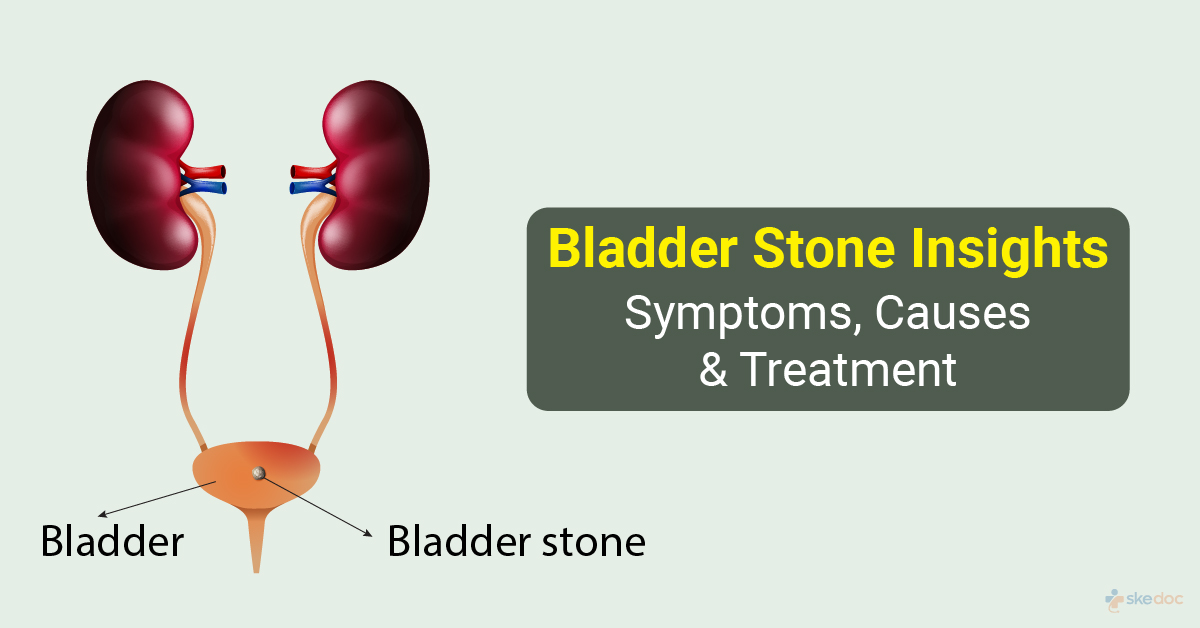Allergy
Blood Diseases
Bone & Joints
Brain
Cancer
Child Care
Cosmetic Surgery
Diabetes
Endocrinology
ENT
Eye
Gen Medicine
General Surgery
Heart
Kidney
Lifestyle
Liver & Digestive
Lung
Men’s Health
Mental health
Physiotherapy
Rheumatology
Skin and hair
Sleep Disorders
Spine
Transplant
Women Health
Thyroid
Vascular Surgery
Bladder Stones

What are Bladder Stones?
Bladder Stones are hard calcified mineral deposits or stones formed and found in the urinary bladder. They are most often seen when there is a presence of highly concentrated urine or when there is stagnation of urine. The presence of stones in the upper urinary tract does not predispose to the formation of stones in the urinary bladder. Bladder stones may be singular or multiple and can be seen even in children.
Alternate names
- Vesical stones
- Bladder calculi
- Vesical calculi
Types
Bladder stones are generally classified based on the minerals that are found in the stone. The most common among these are the following:
- Calcium oxalate
- Calcium phosphate
- Ammonium phosphate
- Uric acid and its salts
- Calcium hydroxy phosphate
- Cysteine
- Xanthine
Causes
These are formed when there is a presence of highly concentrated urine in the bladder, the presence of an acidic environment within the bladder, a high concentration of uric acid, and when there is incomplete emptying of the bladder.
Some conditions that can lead to the formation of bladder stones include:
- Prostate enlargement causing bladder outlet obstruction
- Spinal cord injuries and damage to the nerves supplying the urinary bladder
- Infections of the urinary bladder, especially parasitic
- Bladder inflammation secondary to radiation therapy
- Dehydration
- Bladder diverticula
- Foreign bodies such as gauze, suture material, etc., in the bladder from interventional procedures previously done on the bladder
- Urinary catheters
Risk factors
Some factors that increase the risk of bladder stones include:
- Prostate enlargement
- Stroke
- Spinal cord injuries
- Diabetes
- Herniated lumbar disc
- Age: The very young and the elderly are at a greater risk of developing bladder stones
Symptoms & signs
The signs and symptoms of bladder stones can be the following:
- Increased frequency of urination, especially at night
- Pain during urination
- Lower abdominal pain
- Blood in the urine
- The interrupted flow of urine
- Dark or cloudy urine
Investigations
The following investigations are done to evaluate the presence of bladder calculi:
- Laboratory tests
- CBP & ESR
- Comprehensive Metabolic Panel
- Complete Urine Analysis
- Urine culture and sensitivity
- Imaging tests
- X-ray: Plain radiography of the KUB (kidney, ureters, and urinary bladder), followed by Intra Venous Pyelogram (IVP)
- Ultrasonography
- Unenhanced Spiral CT: It is very sensitive for stones
- Cystoscopy: It is the most common confirmatory test done for Bladder Stones where the inside of the bladder is visualized with the help of an endoscope called a cystoscope
Diagnosis
A diagnosis of bladder stones is established based on medical history, clinical evaluation, and results of the investigations done.
Treatment options
The aim of the treatment of bladder stones is to remove the stones as well as to treat the underlying problem that resulted in the formation of the stone. In a majority of cases, surgical interventions would be required.
Medical management
Medical management includes using potassium citrate, which is given to increase the pH of the urine and make it less acidic, which may result in the dissolution of small stones.
Interventional including surgery and indications for surgery
Surgical interventions are necessary if bladder stones are present along with obstruction to the outflow, such as with benign prostatic hyperplasia. Interventions that are done for the management of bladder stones include
- Transurethral cystolitholapaxy: It is done as an endoscopic surgery using a cystoscope; a high energy source is used to fragment the stones, which are then removed
- Percutaneous cystolitholapaxy: More commonly done in children
- Open suprapubic cystostomy: It is an open surgery in which the stones are not fragmented but removed as a whole; it is usually done when the size of the Bladder Stones is large.
Role of Diet/ Exercise/ Lifestyle changes/ Preventive measures
Some measures that can be taken to prevent the formation of bladder stones include:
- Keeping hydrated and drinking plenty of fluids
- Reducing the risk of bladder and urinary tract infections
- Seeking prompt medical attention if symptoms of prostate enlargement are noticed
Complications
Some complications of bladder stones include:
- Recurrent urinary tract infections
- Long term difficulties with urination
Prognosis
The prognosis that is detected early and managed well is generally excellent.
When to contact the doctor or hospital? / How to identify the emergency or complications?
It is advisable to seek medical attention if the signs and symptoms are noticed.
Indications for hospitalization if required
Brief hospitalization will be required.
Suggested clinical specialist/ Departments to consult for this condition
Urology
Was this article helpful?
YesNo




